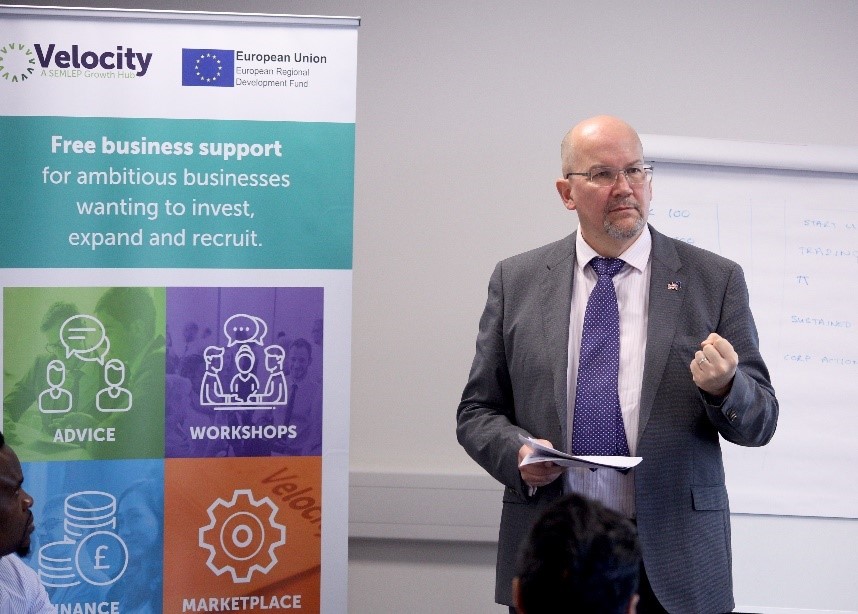
26 February 2018
Picture the scene. You are stepping out of the lift on the ground floor, although it feels like cloud nine. All that pitching practice has paid off. You’re clutching their business card like it’s the winning ticket for a double rollover on the lottery: a potential investor has just agreed to a second meeting in a less confined space to discuss your proposition.
What steps should you next be taking to ensure that they really are a good fit, before you seal the deal?
David Bailey of Merryns LLP is one of the presenters of Velocity Growth Hub’s A to Z of Growth Finance workshop and here he tells us what questions that you should be asking of investors. Although maybe let them get out of the lift before you do.
If your first encounter with the investor isn’t entirely by chance, find out what you can about them beforehand from your professional advisers, people in the know or from public records. Doing this homework and clarifying the following points early in your relationship with them will greatly reduce the chances of misunderstandings later.
You want to know about their own experience and contacts, the limits of their authority, the process that will be followed, the timing of funding and the terms under which it is offered. So, whip out your notebook, check the ink in the pen, and look them in the eye as you dig deep into what matters.
Firstly, do they have direct experience of investing in a company like yours? You should find out how many investments that they have made in the last year and where their deal flow comes from: is it cold approaches, other funds, co-investors, a syndicate or trusted referrers? This establishes their understanding of your business and that you are in the right meeting.

David Bailey,partner Merryns LLP
You can ask (and check online) the companies they have invested in, hold today, and previously sold. You could ask how many of their portfolio have they followed on (invested more than one round of money in) and how many do they expect to need more than one round of investment? What is the size of the follow-on cheque? This establishes they have a long term view of you as well.
Find out what you can about them, as an individual. What value can they add to your business over the next year? This could be useful if they can introduce other investors, help with hiring staff, drive
business development, empower corporate networking, or help you prepare for sale. If it all goes well, you can ask what they learned from preparing for IPO, or from mergers & acquisitions.
Establish the limits of their authority, for example what size investment that they can they make and who makes the final decision to invest, if it is not them personally. Do they lead on investments or rely upon somebody else to form a syndicate? If the decision must be referred to an investment committee, find out when it meets and how it works. This tells you that you are talking to the right person. If you are not, ask for a follow-up meeting with the right person swiftly.
Ask them how long their last investment took from first contact to money in the bank. If the cash isn’t immediately available, find out what they must do to make it available. Startups are vulnerable while asking for investment, businesses move slower without investment, and things change at investors, so speed is important.
Establish if there is anything unusual about the terms that they tend to insist upon in a deal, for example, asking you to pay for due diligence or their legal fees; how interest charges are allocated or if non-refundable deposits feature. Always check with professionals if terms seem “odd”.
Due diligence is vital for both parties. Do they do their own or rely upon somebody else to do it for them and who else advises them on this investment? Whether it is an individual with specific experience of your sector or it might be a legal or accountancy firm, or even a panel, it will be useful for you and your professional advisers to know. Anything that adds complexity to a deal increases the chance it will not close, and adds other people who need to be persuaded.
Because you (as a fellow entrepreneur are aware and always on message), ask them who else they recommend that you should pitch to, and what they are likely to say. This also helps determine their level of interest and will project their view of the deal.
To conclude, ask them what the next steps to complete are from their point of view and how they would like you to follow-up and with whom. The onus of following up is on you. Do so, promptly, politely and on the channels offered.
By now, the investor knows you are serious, professional, supported by the right people and capable of handling the demands of investors. Your chances of reaching a ‘yes’ went up a little, and you should have left an impression that will support your approaches the next time, even if this approach does not directly lead to a pot of gold.
To find out why these questions are important and to get to grips with what’s involved in equity investment and the implicatons for you and your business, book a place on Velocity Growth Hub’s A to Z of Growth Finance workshop in Bedford (7 February), Silverstone (15 March) or Begbroke Science Park (3 April).
Good hunting!

